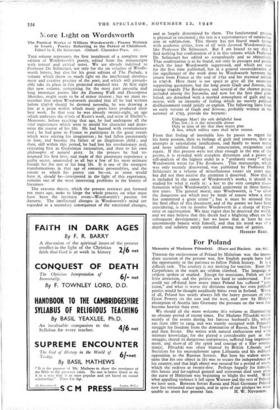More Light on Wordsworth The Poetical Works of William Wordsworth
: Poems Written in Youth ; Poems Referring to the Period of Childhood.
Edited by E. De Selincourt. (Oxford : Clarendon Press. zrs.
Tms volume represents the first instalment of a complete new edition of Wordsworth's poetry, edited from the manuscripts with textual and critical notes. We are already indebted to Professor De Selincourt, not only for the six volumes of Words- worth letters, but also for his great edition of The Prelude, a volume which threw so much light on the intellectual develop- ment and creative practice of the poet, and which will presum- ably take its place in this projected standard text. At first sight this new volume, comprising for the most part juvenilia and long immature poems like An Evening Walk and Descriptive Sketches, might seem to be of minor interest ; but we must re- member that when Wordsworth decided that all he had written before 1797-8 should be deemed juvenilia, he was drawing a line at a point within which many poets have produced their best work. In that year he was already twenty-eight, an age which embraces the whole of Keats's work, and most of Shelley's. Moreover, before reaching that age, he had undergone all the vital experiences which were to mould his character and deter- mine the course of his life. He had burned with revolutionary zeal ; he had gone to France to participate in the great events which were stirring his imagination ; he had fallen passionately in love, and become the father of an illegitimate child ; and then, still within this period, he had lost his revolutionary zeal, retreating first to Godwinian rationalism, and then to his own philosophy of natural piety. In the process he had re- nounced his first love, and made of this passionate experience a guilty secret, unrevealed to all but a few of his most intimate friends for the rest of his long life. It is one of the strangest transformations in that age of romantic personalities, and the extent to which his poetry can be—or, as some would have it, should be—interpreted in the light of this experience, remains one of the most interesting problems in the history of literature.
The extreme theory, which the present reviewer put forward ten years ago, seeks to hinge the whole process on what must have been the intensest event—Wordsworth's passion for Annette. The intellectual changes in Wordsworth's mind are regarded as a secondary consequence of the emotional changes,
and as largely determined by them. The fundamental process is physical or emotional the rest is a superstructure of rationalisa- tion or sublimation. This theory has not found much favour with academic critics, least of all with devoted Wordsworthians like Professor De Selincourt. But I am bound to say that I find nothing but confirmation of it in this volume which Professor De Selincourt has edited so scrupulously and so objectively. That confirmation is to be found, not only in passages and poems which the later Wordsworth suppressed, and which are now for the first time published, but in a general reconsideration of the significance of the work done by Wordsworth between his return from France at the end of 1792 and his mystical rebirth in 1797-8. Here there is not space to give all the necessary supporting quotations, but the long poen.). Guilt and Sorrow, the strange tragedy The Borderers, and several of the shorter poems included among the Nvenilia, and now for the first time pub- lished, are drenched with a morbid atmosphere of guilt and re- morse, with an intensity of feeling which no merely political disillusionment could justify or explain. The following lines from an early version of Guilt and Sorrow, probably written in the summer of 1793, provide the keynote :
Unhappy Man! thy sole delightful hour Flies fast ; it is thy miserable dower Only to taste of joy that thou mayst pine A loss, which rolling suns shall ne'er restore.
From that feeling of inevitable loss he passes to regret for his hasty passion, then to feelings of guilt and remorse, then to attempts at rationalistic justification, and finally to more moral and more sublime feelings of renunciation, resignation and repair. If this process were not clear enough in the text of the poems, it is revealed with complete directness and a power of self-analysis of the highest order in a "prefatory essay" which Wordsworth wrote for The Borderers. This manuscript, which was only recently discovered, was published by Professor De Selincourt in a volume of miscellaneous essays six years ago, but did not then receive the attention it deserved. Now that it is included in the canon of Wordsworth's works, it should be studied for what it really is : a key to the very complex trans- formation which Wordsworth's mind underwent in these forma- tive years. The general moral, says Wordsworth, is "to show the dangerous use which may be made of reason when a man has committed a great crime " ; but it must be stressed that the final effect of this document, and of the poems we have been considering, is not to involve Wordsworth in a charge of hypo- crisy or equivocation. We may regret that he deceived the world, and we may believe that this deceit had a blighting effect on his subsequent development but we know that at least he was uncommonly honest with himself, and that his mind was cf a depth and subtlety rarely exceeded among men of genius.
HERBERT READ.


























































 Previous page
Previous page